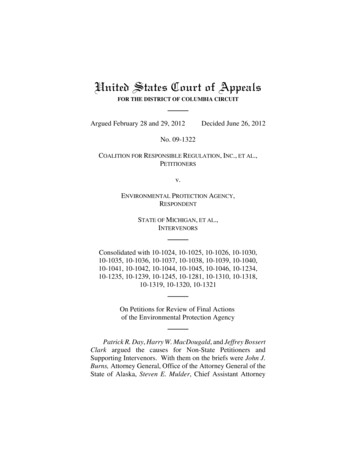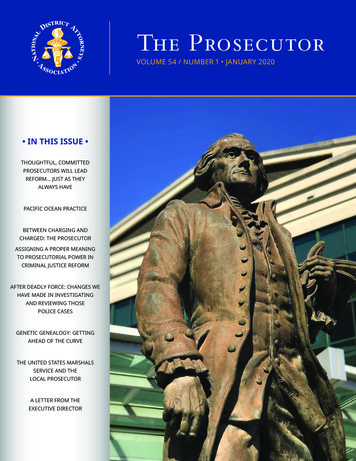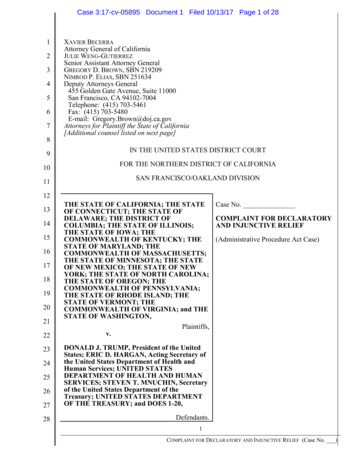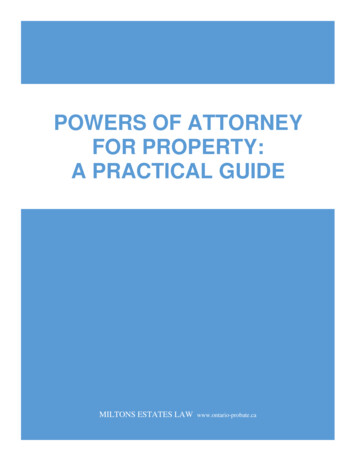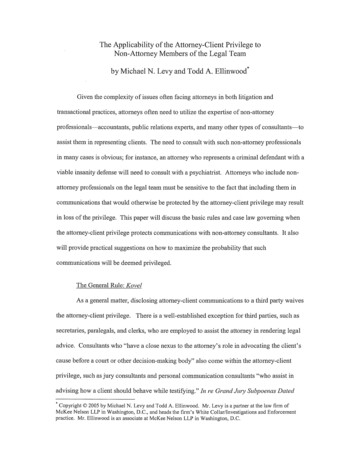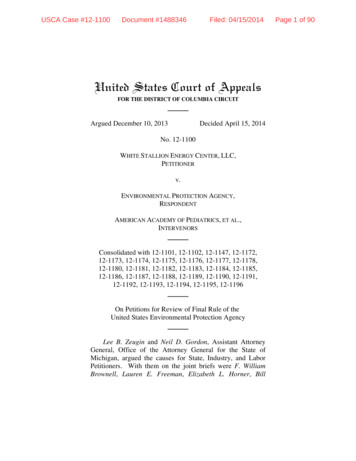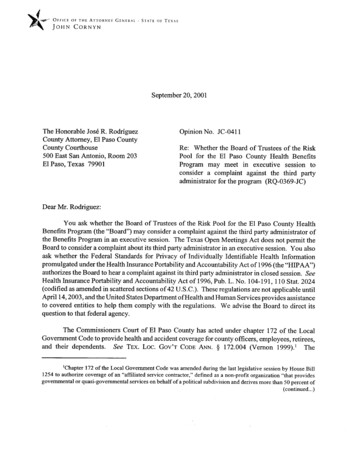
Transcription
-* OFFICE OF THE ATTORNEY GEKERAL . STATE OF TEXASJOHNCORNYNSeptember 20,200lThe Honorable Jose R. RodriguezCounty Attorney, El Paso CountyCounty Courthouse500 East San Antonio, Room 203El Paso, Texas 79901Opinion No. JC-0411Re: Whether the Board of Trustees of the RiskPool for the El Paso County Health BenefitsProgram may meet in executive session toconsider a complaint against the third partyadministrator for the program (RQ-0369-JC)Dear Mr. Rodriguez:You ask whether the Board of Trustees of the Risk Pool for the El Paso County HealthBenefits Program (the “Board”) may consider a complaint against the third party administrator ofthe Benefits Program in an executive session. The Texas Open Meetings Act does not permit theBoard to consider a complaint about its third party administrator in an executive session. You alsoask whether the Federal Standards for Privacy of Individually Identifiable Health Informationpromulgated under the Health Insurance Portability and Accountability Act of 1996 (the “HIPAA”)authorizes the Board to hear a complaint against its third party administrator in closed session. SeeHealth Insurance Portability and Accountability Act of 1996, Pub. L. No. 104-l 91, 110 Stat. 2024(codified as amended in scattered sections of 42 U.S.C.). These regulations are not applicable untilApril 14,2003, and the United States Department of Health and Human Services provides assistanceto covered entities to help them comply with the regulations.We advise the Board to direct itsquestion to that federal agency.The CommissionersCourt of El Paso County has acted under chapter 172 of the LocalGovernment Code to provide health and accident coverage for county officers, employees, retirees,See TEX. Lot. GOV’T CODE ANN. 8 172.004 (Vernon 1999).’ Theand their dependents.‘Chapter 172 of the Local Government Code was amended during the last legislative session by House Bill1254 to authorize coverage of an “affiliated service contractor,” defined as a non-profit organization “that providesgovernmental or quasi-governmentalservices on behalf of a political subdivision and derives more than 50 percent of(continued. .)
The Honorable Jose R. Rodriguez- Page 2(JC-0411)contributions paid by county officials, employees, and retirees are deposited into a risk pooladministered by a board of trustees appointed by the commissioners court. See id. @ 172.004-.009(Vernon 1999 & Supp. 2001). The Board is a governmental body within the meaning of the OpenMeetings Act, which defines “governmental body” to include:a deliberative body that has rulemaking or quasi-judicial power andthat is classified as a department, agency, or political subdivision ofa county or municipality.TEX. GOV’T CODE ANN. 0 551.001(3)(D)(V emon Supp. 2001). The Board exercises governmentalauthority as an agent of the county. See TEX.LOC. GOV’T CODE ANN. 8 172.006(a) (Vernon Supp.2001) (board of trustees supervises operation of risk pool); .009(a) (Vernon 1999) (trustees of riskpool shall invest pool’s money); .Ol 1 (trustees shall declare pool insolvent if they determine that itis unable to pay valid claims within specified time period). Accordingly, the Board must complywith the Open Meetings Act.You inform us that the Board has contracted with a third party administrator to administerthe Risk Pool. See id. 8 172.006 (Vernon Supp. 2001) (board may contract with third partyadministrator). You state that at times a person covered by the County Health Benefits Program willcomplain to the Board about some action by the third party administrator, such as denial of a claim?In reviewing the administrator’s handling of such claims, the Board may consider informationpresented orally by the complainant, including details of medical history, diagnosis, and treatment,as well as medical records and other documentation provided by the complainant. You ask whetherthe Board may meet in an executive session under section 551.074 of the Government Code toreview the third party administrator’s actions in these cases.Pursuant to section 55 1.074 of the Governmentto conduct an open meeting:Code, a governmentalbody is not required(1) to deliberate the appointment, employment, evaluation,reassignment, duties, discipline, or dismissal of a public officer oremployee; or‘(.continued)its gross revenues from grants or funding from the political subdivision.”See Act of May 17,2001,ch. 491, 2001 Tex. Sess. Law Serv. WL TX LEGIS 491 (2001) (effective Sept. 1,200l).2Letter from HonorableAttorney General (Mar. 21,200l)Jose R. Rodriguez, El Paso County Attorney,(on file with Opinion Committee).to HonorableJohn77th Leg., R.S.,Cornyn,Texas
The HonorableJose R. Rodriguez- Page 3(JC-04(2) to hear a complaintemployee.11)or chargeagainstan officerorTEX. GOV’T CODE ANN. 55 1.074(a) (Vernon 1994). This provisionor employee55 1.074(b).who is the subject of the deliberationdoes not apply if the officeror hearing requests a public hearing. See id. 8Section 55 1.074 authorizes a governmental body to meet in executive session to deliberateabout a public officer or employee, but it does not authorize closed deliberations about other agentsof a governmental body, such as an independent contractor. See Bd. ufTrs. v. Cox Enters., Inc., 679S.W.2d 86, 90-91 (Tex. App.-Texarkana1984), rev’d in part on other grounds, 706 S.W.2d 956(Tex. 1986); Tex. Att’y Gen. Op. No. MW-129 (1980) at 2. See also Tex. Att’y Gen. Op. No. DM149 (1992) (members of advisory committees appointed by Texas Commission on Fire Protectionare neither officers nor employees, and commission may not meet in executive session to discussqualifications of persons under consideration for appointment).The third party administrator isneither an officer nor an employee of the Risk Pool.A third party administrator is “a person who collects premiums or contributions from or whoadjusts or settles claims in connection with life, health, and accident benefits . . . for residents of thisstate.” TEX. INS. CODE ANN. art. 21.07-6, 8 l(1) (Vernon Supp. 2001); 28 TEX. ADMIN. CODE 8A county risk pool “may be7.1601 (2001) (p rovisions regulating third party administrators).administered by a staff employed by the pool, an entity created by the political subdivision . . . ora third party administrator.” TEX. Lot. GOV’T CODEANN. 5 172.006(b) (Vernon Supp. 2001). Thestatute distinguishes between a third party administrator and staff employed to administer the pool,thus recognizing that a third party administrator is not an employee. A board of trustees and othergovernmental bodies contract for the services of a third party administrator. See id. 8 172.006(c);see also Tex. Att’y Gen. Op. Nos. DM-418 (1996) at 9-l 3, JM-1038 (1989) (considering whethercontract for services of third party administrator is exempt from competitive bidding law as contractfor professional services). An employee, in contrast, would be employed by a board of trustees towork for salary or wages. See V OXFORDENGLISHDICTIONARY191 (2d ed. 1989); BLACK’S LAWDICTIONARY543 (7th ed. 1999). The Board does not have an employer-employeerelationship withthe third party administrator.Nor is the third party administrator an officer of the Risk Pool. A public officer generallyhas a fixed term and may be removed only in accordance with law. Aldine Indep. Sch. Dist. v.Standley, 280 S.W.2d 578, 581 (Tex. 1955). Moreover, a public officer is an individual in whoma sovereign function of the government is conferred to be exercised for the benefit of the public,largely independent of the control of others. Id. at 583. A third party administrator is subject tocontractual and regulatory controls and does not exercise any sovereign function of the governmentlargely independent of the control of others. The Board may not deliberate in executive session
The HonorableJose R. Rodriguez- Page 4under section 55 1.074 of the Governmentadministrator.(JC-04 11)Code about complaintsmade against the third partyYou also ask whether the Federal Standards for Privacy of Individually Identifiable HealthInformation, 45 C.F.R. parts 160 and 164, permit closed-meeting deliberations about complaintsconcerning administration of a county health benefits program when individually identifiable healthinformation is involved, and whether these regulations prohibit open-meeting deliberation about suchcomplaints. See 45 C.F.R. pt. 160 (2000); 65 Fed. Reg. 82462,82802-829 (Dec. 28,200O); 66 Fed.Reg. 12434 (Feb. 26,200l) (to be codified at 45 C.F.R. pt. 164).As part of the HIPAA, Congress directed the Secretary of Health and Human Services topromulgate regulations setting privacy standards for medical records.See Health InsurancePortability and Accountability Act of 1996, Pub. L. No. 104-l 91, 0 264, 110 Stat. 2024 (codifiedat 42 U.S.C. 8 1320d-2 (Supp. IV 1998) (historical & statutory note). Pursuant to this directive, theSecretary has issued Standards for Privacy of Individually Identifiable Health Information, codifiedat 45 C.F.R. parts 160 and 164. The standards were effective April 14,2001, but they will not applyuntil April 14,2003, or April 14,2004, in the case of small health plans. See 65 Fed. Reg. 82462,82829 (Dec. 28,200O); 66 Fed. Reg. 12434 (Feb. 26,200l) (to be codified at 45 C.F.R. 8 164.534).With certain exceptions, the privacy regulations preempt contrary state law. See 42 U.S.C. 9 1320d7 (Supp. IV 1998); 65 Fed. Reg. 82462,828OO (Dec. 28,200O); 66 Fed. Reg. 12434 (Feb. 26,200l)(to be codified at 45 C.F.R. 0 160.201-.205).Your question requires us to determine whether the El Paso County Health Benefits Programis a “covered entity” subject to the standards set out in 45 C.F.R. parts 160 and 164. See 45 C.F.R.§§ 160.102(a), ,103 (2000) (defining “covered entity”). A covered entity may not use or discloseprotected health information, except as permitted or required by 45 C.F.R. part 160, subpart C, orpart 164. See 65 Fed. Reg. 82462,82805 (Dec. 28,200O); 66 Fed. Reg. 12434 (Feb. 26,200l) (tobe codified at 45 C.F.R. 0 164.502(a)). We would thus have to consider whether the Board woulddisclose protected health information in violation of the regulations if it were to deliberate in opensession about medical information and medical records provided at the meeting by a beneficiary ofthe program. The privacy regulations do not expressly state whether or not deliberations aboutmedical information at public meetings would be an unauthorized disclosure of protected healthinformation. See 65 Fed. Reg. 82462,82803 (Dec. 28,200O); 66 Fed. Reg. 12434 (Feb. 26,200l)(to be codified at 45 C.F.R. @ 164.501) (disclosure defined to include divulging in any manner ofinformation outside the entity holding the information).Your request raises questions of first impression about the federal regulations. Moreover,the United States Department of Health and Human Services, the federal agency in charge ofenforcing the regulations, has not yet issued any guidelines or other interpretations of them. See 65Fed. Reg. 82462,82801-802(Dec. 28,200O); 66 Fed. Reg. 12434 (Feb. 26,200l) (to be codifiedat 45 C.F.R. 89 160.300-.3 12). The regulations are complex, and determining how they affect the
The HonorableJose R. Rodriguez- Page 5(JC-0411)El Paso County Health Benefits Program would require more information about the operation of thatprogram than is provided by your request letter and chapter 172 of the Local Government Code. Wecannot investigate and resolve fact questions in an attorney general opinion. See, e.g., Tex. Att’yGen. Op. Nos. JC-0328 (2000) at 6, JC-0152 (1999) at 12, JC-0020 (1999) at 2, DM-98 (1992) at3,H-56 (1973) at 3, M-187 (1968) at 3,0-2911 (1940) at 2. TheDepartmentofHealthandHumanServices provides assistance to help covered entities comply with the regulations. See 65 Fed. Reg.82462,828Ol (Dec. 28,200O); 66 Fed. Reg. 12434 (Feb. 26,200l) (to be codified at 45 C.F.R. 8160.304); see also Department of Health and Human Services, Office for Civil Rights, intemet siteon HIPAA privacy standards, available at http:l/www.hhs.gov/ocr/hipaaf.3The El Paso CountyHealth Benefits Program has at least until April 14, 2003, to decide how the privacy regulationsapply to it, or if it is deemed a small health plan, until April 14,2004. Thus, the Board may requestinformation on how the federal regulations apply to the Risk Pool from the federal agency in chargeof enforcing them. Under these circumstances, we advise its representatives to seek information andassistance on its questions from the United States Department of Health and Human Services.We note that recently enacted state legislation, Senate Bill 11 of the Seventy-seventhLegislature, requires a “covered entity” to comply with certain privacy standards adopted under theHealth Insurance Portability and Accountability Act of 1996, including those relating to “uses anddisclosures of protected health information.” Act of May 27,2001,77thLeg., R.S., ch. 15 11, 5 1,sec. 181.101(3), 2001 Tex. Sess. Law Serv. WL TX LEGIS 15 11 (2001) (to be codified at TEX.HEALTH& SAFETY CODE ANN. ch. 18 1). A covered entity includes, among other entities, any personwho “on a cooperative, nonprofit, or pro bono basis, engages . . . in the practice of assembling,collecting, analyzing, using, evaluating, storing, or transmitting protected health information.” Id.at 8 1, sec. 181.001(b)(l)(A).A “covered entity” may include a governmental unit. See id.However, there is an exemption for an employee benefit plan or a covered entity or other personacting in connection with an employee benefit plan. See id. at 8 1, sec. 181.055. A covered entityis required to comply with the requirements of chapter 18 1 of the Health and Safety Code, as addedby Senate Bill 11, “not later than September 1,2003.” Id. at 8 5(b). Thus, assuming the Risk Poolis a covered entity within Senate Bill 11, it should know what the federal privacy standards requireof it by the time it becomes subject to the provisions of chapter 18 1.PortabilityHIPAA).3The Texas Health and Human Services Commission also provides information about the Health Insuranceand AccountabilityAct. See l(information about
The Honorable Jose R. Rodriguez- Page 6(JC-0411)SUMMARYThe Board of Trustees of the Risk Pool for the El PasoCounty Health Benefits Program may not deliberate about complaintsagainst its third party administrator in an executive session under thepersonnel exception to the Texas Open Meetings Act. The third partyadministrator is not an officer or employee within that exception.The Standards for Privacy of Individually Identifiable HealthInformation promulgated under the Health Insurance Portability andAccountability Act of 1996 (the “HIPAA”), Pub. L. No. 104-l 91,preempt contrary state law. The Board of Trustees of the El PasoCounty Health Benefits Program should seek advice from the UnitedStates Departmentof Health and Human Services about theapplication of these standards to the El Paso County Health BenefitsProgram and to public meetings in which the Board of Trusteesdeliberates about complaints against its third party administratorinvolving individually identifiable health information.Yrsvtrul )4JY!fJOHNCORNYNAttorney General of TexasHOWARD G. BALDWIN, JR.First Assistant Attorney GeneralNANCY FULLERDeputy Attorney General - General CounselSUSAN D. GUSKYChair, Opinion CommitteeSusan’. GarrisonAssistant Attorney General, Opinion Committee
County Attorney, El Paso County County Courthouse 500 East San Antonio, Room 203 El Paso, Texas 79901 Opinion No. JC-0411 Re: Whether the Board of Trustees Risk . 2Letter from Honorable Jose R. Rodriguez, El Paso County Attorney, to Honorable John Cornyn, Texas Attorney General (Mar. 21,200l) (on file with Opinion Committee). .


